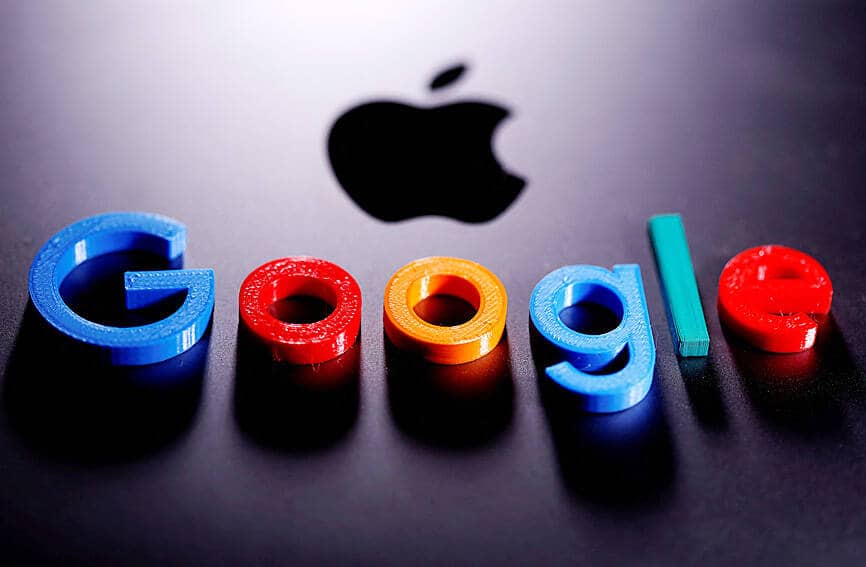Joining forces would build upon the lengthy history of cooperation between the two firms, which has contributed to the development of numerous Apple products, including maps and search.
In its haste to adopt a technology that has disrupted the IT sector, Apple is in talks with Google about incorporating the search giant’s Gemini generative AI model into the next iPhone.
The talks are still in their early stages, and the specifics of any possible agreement have not been finalized, according to three sources familiar with the matter. According to one of these sources, Apple has been in talks with other AI firms about leveraging their huge language models that can analyze massive quantities of data and generate text autonomously.
Apple CEO Tim Cook has assured investors that the tech giant will unveil new generative AI features this year. Samsung and Google, two of the company’s main competitors in the smartphone market, have integrated Gemini into their latest products to enable video editing and audio summarization.
Both Google and Apple chose not to comment. Earlier, Bloomberg reported on their discussions.
One of the longest-running alliances in technology would be extended with an Apple-Google agreement on generative AI. Google has been an integral part of the iPhone’s success story since its 2007 introduction by Apple. Google paid Apple around $18 billion annually for the privilege of being the default search engine on the iPhone’s Safari browser; this lucrative arrangement began with Google Maps for navigation and eventually expanded to include other products.
One more way Google is trying to bridge a gap in Apple’s product line is by discussing adding generative AI capabilities to the iPhone. According to two sources familiar with the matter, Apple’s endeavor to create its own extensive language model—the underlying technology of chatbots such as Gemini and ChatGPT—has been experiencing delays.
It has cost Apple a lot to wait so long to release an AI product. This year, Microsoft—which has been actively pursuing AI—deposed it as the most valuable public business in the world, ending its decade-long reign atop the rankings. People are raving about this invention because of all the money it could make and how it could shake up industries.
Apple may emerge from its setbacks to become a dominant force in artificial intelligence. Google and others are interested in partnering with the company because of its two billion active devices. In the future, when artificial intelligence applications assist individuals with managing their schedules or health data, its reputation for safeguarding clients’ private information could be useful.
If an agreement is struck, the Gemini model may be made available on iPhones all around the world. This would provide Google with access to a huge user base and further mainstream generative AI. The idea of a partnership with Apple is enticing since, very immediately, Google’s AI might surpass its main competitor, OpenAI, maker of ChatGPT, in terms of user adoption.
In light of Google’s recent AI stumbles, Apple’s decision to partner with the search engine as an AI supplier would send a strong message of confidence. Bard, the first artificial intelligence chatbot from the business, emerged in March of last year to mixed reviews and had a hard time gaining traction compared to ChatGPT.
Gemini, Google’s new chatbot, made its debut in February. Last month, the chatbot encountered issues when users discovered that its picture generator generated racially inaccurate depictions of historical individuals and consistently refused to create white persons, resulting in charges of racism. In an effort to resolve the issue, Google removed the feature that allows users to make photos of people.
Analyst Toni Sacconaghi of Bernstein Research characterized a potential merger between Apple and Google as a “win-win” in a note he sent out on Tuesday. The deal would validate Google’s efforts with Gemini while providing Apple with generative AI for iPhones. Additionally, he mentioned that Apple might earn money without really owning an AI model on iPhones. Instead, it could receive a commission from Google, which offers its Gemini Advanced app for $19.99 per month.
Businesses have not yet profited from AI that generates new ideas. Companies and individuals are just now beginning to foot the bill for the new technology that comes with operating massive language models in the cloud, and the expenses are astronomical. However, they remain hopeful that earnings will rise in tandem with the advancements in AI capabilities and the subsequent drop in the costs of constructing the data centers that will power these systems.
The United States government may investigate any new agreement between tech giants Apple and Google. Google is facing a final stages of a lawsuit filed by the Justice Department, which accuses the company of violating competition rules through its practice of paying Apple to be the default search engine on many services, including the iPhone. The nonjury trial is set to conclude this year according to Judge Amit P. Mehta of the United States District Court for the District of Columbia.
